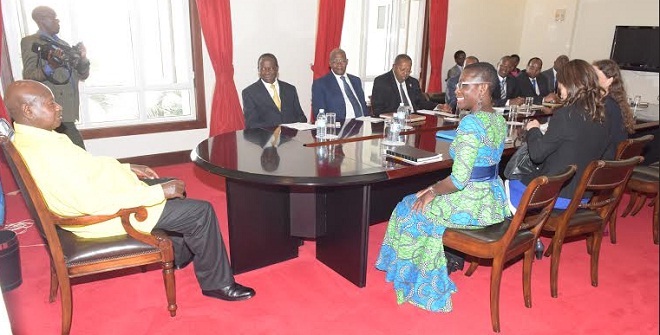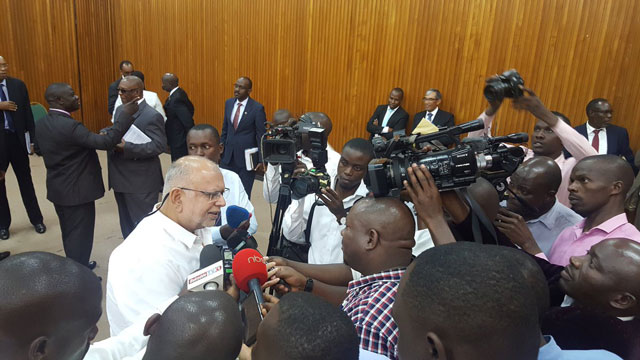
World Bank cautious
Reputable international bodies such as the World Bank and International Monetary Fund have indicated in their reports that the medium-term outlook for Uganda is not favourable and that the decline in Uganda’s real GDP growth and corresponding loss of jobs could even increase if the country is to face a more widespread pandemic and other disasters.
The heightened uncertainty around the Jan.14 general elections further exacerbated these risks, analysts say. Failure to manage the likely post-election violence could scare away investors and lead to capital flight, spiraling inflation.
In 2016, after the general elections, the economy expanded by 4.0%, lower than the 5.5% projection and inflation remained within single digit and BoU target averaging 5.7%.
However, in 2011, the story was different. The impact of overspending in the general election, caused a big jump in inflation from 5-6% to slightly over 30%, the highest since 1993, and affected financial stability.
The situation was worsened by the opposition walk-to-work protests that paralysed business activities and led to a sharp decline in economic growth quoted in the range of 3-3.4%, down from slightly over 6% in the previous year.
COVID recovery programme
This time around, analysts say, the government needs to walk the talk in line with its COVID-19 recovery programme and keeping law and order to save the economy.
It indicated in the FY2020/2021 budget, that it would focus on reviving small and medium scale business that are suffering due to the coronavirus pandemic.
Government allocated Shs94billion as credit through SACCOs and microfinance to benefit SMEs and an additional Shs104billion was provided to Uganda Development Bank to enable businesses especially manufacturers and large scale private firms to borrow at low interest rates. Government also pledged to urgently pay arrears it owes the private sector – some of it has been paid, according to suppliers of government that the Independent spoke to.
The Bank of Uganda is also expected to watch the restructuring of loans by banks for those customers that were badly hit by the impact of COVID-19 restrictions.
As at December, the banking institutions had restructured loans with clients worth Shs6.7trillion, according to the BoU.
In addition, experts urge the government to control, put into good use the money it borrows for public projects so as to yield a good return. The country’s total public debt increased by 21.7% in FY2019/20, according to Bank of Uganda Monetary Policy Report for December 2020.
External debt increased from US$8.35 to US$10.45billion while domestic debt increased from Shs16.2 trillion to Shs19.1 trillion.
“As a percentage of GDP, nominal public debt increased from 35.3% in June 2019 to 41.0% in June 2020. In present value terms, public debt to GDP increased from 27.0% to 31.8%,” according to the report.

Private sector concerns
Private sector players are urging the government to further improve the business environment to support the growth of their enterprises and the economy at large.
“…it is also my prayer that government, extends, into 2021 and possibly 2022, many of the credit relief and tax administration measures it had put in place at the peak of the first wave of COVID-19, to aid quicker economic recovery,” Sudhir Ruparelia, the founder and chairman of the Ruparelia Group said in his new year message.
Daniel Birungi, the executive director for Uganda Manufacturers Association told The Independent that his members want free movement/access to the East African market in line with the signed trade protocols.
Manufacturers have since the beginning of last year, blamed authorities in Nairobi for blocking their products from accessing the Kenyan market on flimsy grounds and in contravention of the East African Common Market commitments that guarantees unfettered free movement of goods and services within the East African Community trading bloc.
“We want to find a diplomatic solution and not a diplomatic row,” Birungi said last year, “we are aware that the two governments have been engaging but there seems not to be any movement on these issues.”
Increasing exports would strengthen the local currency and boost economic growth in the wider scheme of things. President Yoweri Museveni has in recent weeks been commissioning economic growth related projects in the sectors of manufacturing/industry, works and transport, energy and more, which are expected to create opportunities in form of jobs, technology transfer, tax and ultimately save the economy from the problems it is facing.
Beyond Uganda
The World Bank Group said in its latest Global Economic Prospects report released on Jan.05 that the global economy is on track to grow by 4% in 2021 for as long as vaccination for COVID-19 becomes widespread throughout the year.
“The global economy appears to be emerging from one of its deepest recessions, and beginning a subdued recovery,” the World Bank Group President David Malpass said.
Although the global economy is growing again after a 4.3%, contraction in 2020, the bank said, the pandemic has caused a heavy toll of deaths and illness, plunged millions into poverty, and may depress economic activity and incomes for a prolonged period.
It said that top near-term policy priorities are controlling the spread of COVID-19 and ensuring rapid and widespread vaccine deployment.
The World Bank Group has made available $12bn to support the vaccination of a billion people in developing countries, according to Malpass.
He added that the baseline assumption for 2021 growth is that “we will have widespread vaccine rollout” achieved in advanced economies and major emerging market and developing economies in the second half of 2021.
According to the report, the near-term outlook remains “highly uncertain,” and different growth outcomes are still possible.
A downside scenario in which infections continue to rise and the rollout of a vaccine is delayed could limit the global expansion to 1.6% in 2021. In an upside scenario, with successful pandemic control and a faster vaccination process, global growth could accelerate to nearly 5%.
To support economic recovery, the bank says, authorities need to facilitate a re-investment cycle aimed at sustainable growth that is less dependent on government debt; policymakers need to continue to sustain the recovery, gradually shifting from income support to growth- enhancing policies.
In the long term, in emerging market and developing economies, policies to improve health and education services, digital infrastructure, climate resilience, and business and governance practices will help mitigate the economic damage caused by the pandemic, reduce poverty and advance shared prosperity.
Beyond this year, the WB says, global growth is projected to moderate to 3.8% in 2022, weighed down by the pandemic’s lasting damage to potential growth.
 The Independent Uganda: You get the Truth we Pay the Price
The Independent Uganda: You get the Truth we Pay the Price


